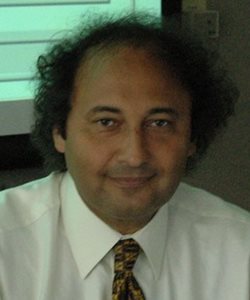19 December 2014
Extension cybersecurity instructor: Sony attack is 'the first strike'
 Cybersecurity expert Sameh El Naggar, a UC San Diego Extension instructor, doesn’t hesitate to describe the cyberattacks on Sony Corporation as “the Pearl Harbor of cybersecurity.”
Cybersecurity expert Sameh El Naggar, a UC San Diego Extension instructor, doesn’t hesitate to describe the cyberattacks on Sony Corporation as “the Pearl Harbor of cybersecurity.”
“We have been attacked and this is the first strike,” said El Naggar, a computer consultant and training specialist at San Diego-based Teradata Corporation. Such cyberattacks, he said, hold the potential to negatively impact “every aspect of our economy and way of life.”
To further his point, El Naggar cited the sophisticated cyber attack in 2007 that virtually shut down Estonia, a country in the Baltic region of Northern Europe. Effected targets included government operations, banks, ATMs, and media outlets, as well as private accounts.
“Sony was very lax in their cybersecurity,” said El Naggar. “I’ve heard that the password for Sony’s top executive was close to being as simple as SONY123. They didn’t really care about security. They didn’t take it seriously. To me, that’s one of the reasons they were targeted.”
 Sameh El Naggar: "We have to protect ourselves. We don’t want this to happen again.”
Sameh El Naggar: "We have to protect ourselves. We don’t want this to happen again.”
Sony Pictures canceled the release of “The Interview,” a theatrical movie based on the fictional assassination of North Korea’s leader. The decision was made after threats from hackers that broke into Sony’s computer system and threatened mass attacks on theaters that screened it, as well as theater-goers.
President Obama has asserted that the hackers are North Korea-based and state-sponsored, which drew a series of denials and threats from a North Korean foreign ministry spokesman.
The movie had been set for a Christmas Day release.
“As a nation, we definitely need to beef up our cybersecurity in every regard,” said El Naggar, “including our water supplies, our electrical grids, ATMs, etc. If we’re not careful, they could shut down major parts of our economy. We have to protect ourselves. We don’t want this to happen again.”
El Naggar has 10 years of international cybersecurity experience, as well as expertise in developing and teaching courses in network and system design.
His next Extension course is UNIX Shell Programming, a nine-week course that starts Jan. 22. The Professional Certificate for UNIX Systems Administration includes a six-session course on UNIX Systems Security Fundamentals, starting March 3.